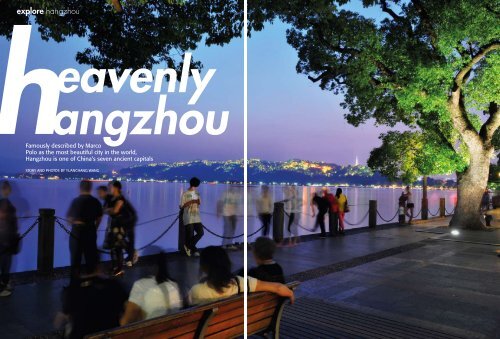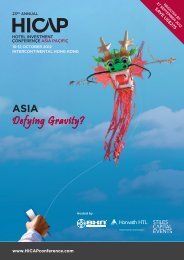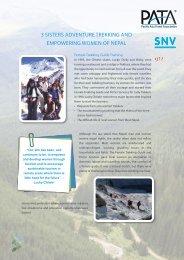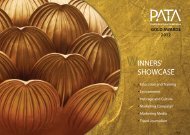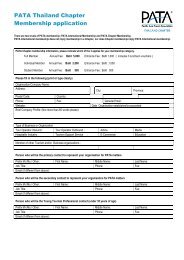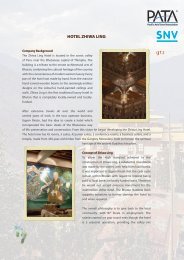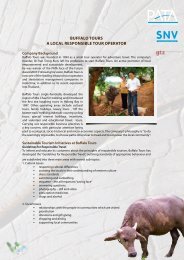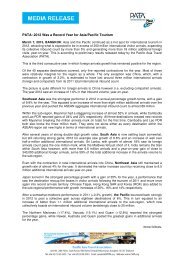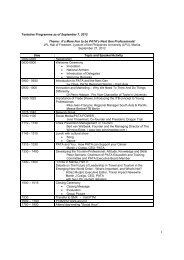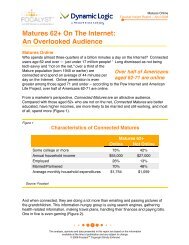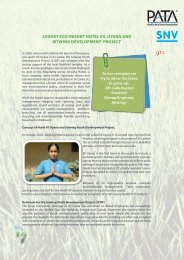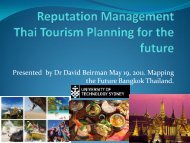Create successful ePaper yourself
Turn your PDF publications into a flip-book with our unique Google optimized e-Paper software.
<strong>explore</strong> <strong>hangzhou</strong><br />
Famously described by Marco<br />
Polo as the most beautiful city in the world,<br />
Hangzhou is one of China’s seven ancient capitals<br />
Story and photos by Yuanchang Wang<br />
44 pata Compass September/October 2012<br />
September/October 2012 pata Compass 45<br />
Exp. Hangzhou Sep-Oct 12.indd 44-45 44<br />
45<br />
13/9/12 11:00:06
<strong>explore</strong> <strong>hangzhou</strong><br />
The scenic capital of Zhejiang province<br />
is its nerve centre of politics, business,<br />
culture, science and education.<br />
Once the capital of the Southern Song<br />
and Tang Dynasty, it was settled as early as<br />
5,000 years ago, spawning the Neolithic jade<br />
culture of Liangzhu.<br />
The city’s privileged geographic location in<br />
the southern part of the Yangtze River Delta,<br />
at the western end of Hangzhou Bay, endows<br />
Hangzhou with a romantic spirit and humid<br />
climate that has given it designations like<br />
“The Most Livable City” and “Garden City.” In<br />
2011, Hangzhou was recommended by the<br />
New York Times as a sublime getaway.<br />
All the fanfare is hardly new. Hangzhou<br />
has been getting rave reviews from travellers<br />
as far back as the 13th century when Marco<br />
Polo sung its praises in overblown operatic<br />
terms: “Hangzhou is the most beautiful and<br />
elegant city in the world.”<br />
MOONCAKE FESTIVAL<br />
Hangzhou is a scenic place to celebrate<br />
the Mid-Autumn Festival, now the second<br />
grandest festival on the Chinese calendar<br />
and a national holiday since 2008. This year’s<br />
holiday falls on September 30th, just before<br />
the National Day break of October 1st–7th,<br />
which means a total of eight days off for<br />
voyageurs to hit the road.<br />
Also known as the Mooncake Festival,<br />
the lunar fest of September 30th is well<br />
known for throngs of people carrying brightly<br />
lit lanterns and fire dragon dances, for eating<br />
mooncakes and matchmaking, for children<br />
hoisting balloons emblazoned with the moon<br />
rabbit and, in general, for having more lights<br />
blazing than Vegas on a Saturday night.<br />
The lakeside setting in Hangzhou will<br />
make this most magical of nights a little<br />
more enchanting.<br />
Lake View<br />
In China there is only one city whose lake has<br />
been venerated and lauded for roughly 1,500<br />
years: Hangzhou.<br />
This metropolis of 6.7 million is famous<br />
for its West Lake, which got its name because<br />
it’s located west of the city, and spreads<br />
out across the alluvial plain formed by the<br />
Qiantang River.<br />
The lake is the heart and kidney of<br />
Hangzhou, boating the primary pastime.<br />
Listen to the boatmen reciting poems and<br />
time-honoured tales, like “Three Pools<br />
Mirroring the Moon,” “Lingering Snow on<br />
Broken Bridge,” “Orioles Singing in the<br />
Willows,” and “Autumn Moon over a Calm<br />
Lake,” for a voyage into classical folklore.<br />
For a panoramic view of the lake, scale<br />
the Leifeng Pagoda. At night check out<br />
the Su and Bai Causeway or stroll along n<br />
Xihu XinTiandi with posh shops and cool<br />
restaurants, coffee kiosks and ice cream<br />
parlours, in the trendy part of the city.<br />
To get more into the aquatic spirit of<br />
Hangzhou, head for the Xixi Wetland and the<br />
Grand Canal.<br />
SILK & SHRINES<br />
Legends have been spun from the tapestry<br />
of five millennia worth that is Hangzhou’s<br />
contribution to the silk art and trade. During<br />
the Tang Dynasty (618-907 AD), the<br />
weaving techniques reached their zenith<br />
and Hangzhou was dubbed the “Capital of<br />
Silk.” Boosted by its textile and silk industries,<br />
Hangzhou has developed a strong garment<br />
industry and is also known as the “city of<br />
women’s wear”.<br />
In the Silk Museum, visitors can buy<br />
pure silk clothes, and in the backyard hall<br />
watch the traditional handmade silk weaving<br />
processes.<br />
But that’s only the tip of the pagoda in<br />
terms of museums. The Scissors Museum is<br />
not a museum exactly, but a showroom for<br />
the Zhang Xiaoquan Scissors Company, which<br />
makes 80% of China’s scissors.<br />
For anyone interested in pottery, the<br />
excavated Southern Song Imperial Kiln is<br />
a “dragon kiln” and a great place to potter<br />
46 pata Compass September/October 2012<br />
September/October 2012 pata Compass 47<br />
Exp. Hangzhou Sep-Oct 12.indd 46-47 46<br />
47<br />
13/9/12 11:00:31
<strong>explore</strong> <strong>hangzhou</strong><br />
around. Outside the neighbouring township<br />
of Fuyang is a paper mill and printing shop<br />
that produces hand-made paper and handbound<br />
books and other publications.<br />
Hangzhou is also home to many temples<br />
and shrines. Among this illustrious number,<br />
Lingyin Temple stands out. This complex is<br />
the largest and always crowded. In particular,<br />
the revered Buddha images carved into the<br />
cliff side deserve appreciation.<br />
Perched on a bluff above the Qiantang<br />
River is the massive, red brick Liuhe Pagoda,<br />
which can be ascended by a daunting<br />
internal staircase.<br />
STOCK UP ON SOUVENIRS<br />
Longjing (Dragon Well) tea is considered the<br />
finest green tea in China and cultivated in the<br />
hilly regions around the West Lake. Longjing<br />
and Meijiawu, two famous tea-producing<br />
villages, are the places to pick a leaf from<br />
Hangzhou’s tea culture, and enjoy a tasty cup.<br />
Visitors can also pick up high-quality tea at<br />
rock-bottom prices.<br />
When shopping in Hangzhou one street<br />
runs through the minds of souvenir hunters:<br />
Qinghefang Historical Street, where they sell<br />
loads of local products, like arts and crafts,<br />
special snacks, jewelries and antiques. Its twin<br />
thoroughfare, Southern Song Dynasty Imperial<br />
Street, was renamed after an astounding<br />
discovery in 2004 when ruins of that dynasty,<br />
including an imperial street, a bridge ramp<br />
and pier, part of a palace and its walls, were<br />
unearthed.<br />
These days, there is no arbiter of travel<br />
taste like TripAdvisor. In the 2012 Travellers’<br />
Choice awards, Hangzhou placed number<br />
five on the top 10 list of Chinese destinations.<br />
And that says it all.<br />
LODGING<br />
Hangzhou Friendly Hotel, a fourstar<br />
hotel, located on Pinghai Road,<br />
about 300 metres far away from<br />
the West Lake, is a good choice for<br />
accommodations. Sitting in the<br />
rotating restaurant on the 20th floor<br />
you can take a panoramic view of<br />
the West Lake.<br />
www.friendship-hotel.com.<br />
FOOD<br />
Waipojia, a chain restaurant serving<br />
Hangzhou delicacies, has more<br />
than 50 branches located in a dozen<br />
Chinese cities. You can even order<br />
online at www.waipojia.com.cn<br />
TRAVEL INFO<br />
Check the website of PATA members<br />
the Hangzhou Tourism Commission,<br />
an excellent resource for up-to-date<br />
travel info: www.gotohz.com<br />
48 pata Compass September/October 2012<br />
September/October 2012 pata Compass 49<br />
Exp. Hangzhou Sep-Oct 12.indd 48-49 48<br />
49<br />
13/9/12 11:01:24


